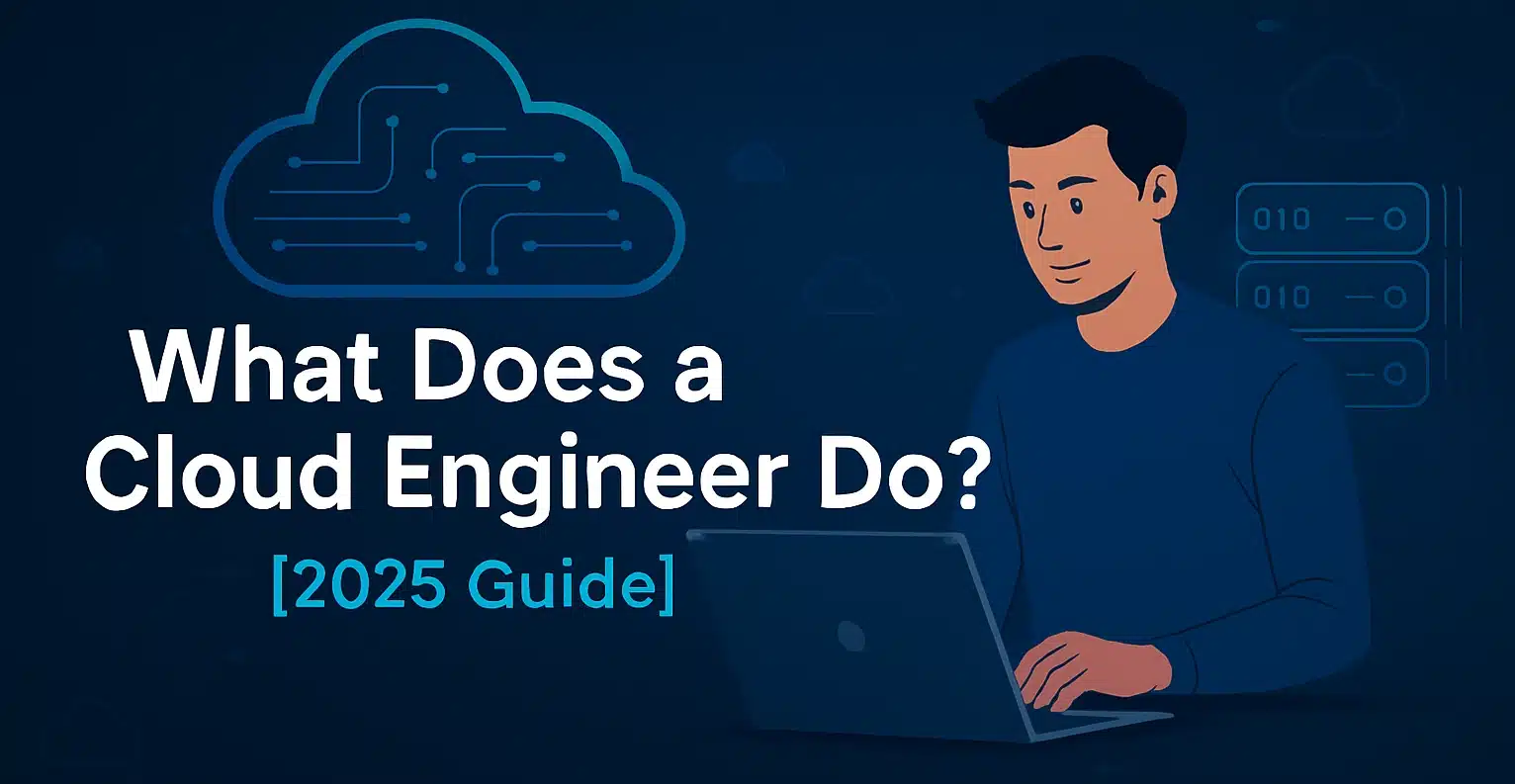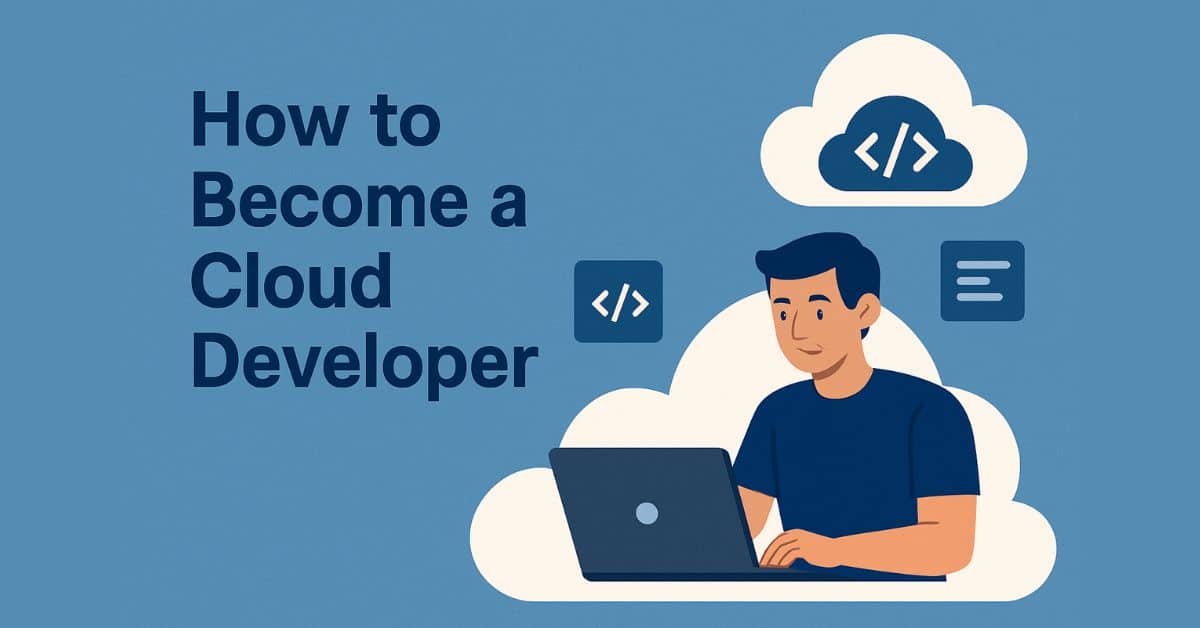- Who Is a Cloud Engineer?
- Key Responsibilities of a Cloud Engineer
- Tools & Technologies Used by Cloud Engineers
- Skills Required to Become a Cloud Engineer
- Cloud Engineer vs Cloud Developer: Key Differences
- Salary Trends in India
- How to Learn Cloud Engineering (Free Courses)
- Real-World Projects to Build Your Portfolio
- Conclusion
- Frequently Asked Questions
Cloud Engineer positions have acquired essential importance because organizations move their operations to cloud environments. Cloud Engineers enable companies to optimize the cloud infrastructure of AWS, Microsoft Azure or Google Cloud for improved performance alongside reduced costs and increased agility.
This career guide explores the role of Cloud Engineers, highlighting the essential tools, techniques, and skills they use, along with the different paths and responsibilities within the cloud ecosystem.
PG in Cloud Computing With AI Skills
Learn AWS, Azure & GCP with 80+ projects, 120+ services, expert mentorship & career support. Now with Applied AI on Cloud!
Who Is a Cloud Engineer?
Cloud engineering professionals design and operate cloud infrastructure frameworks for organizations to deploy and handle while developing these platforms in cloud environments.
Organizations leverage their expertise to develop cloud applications which enables them to store data and manage networks and automate services delivery across cloud infrastructure. Cloud Engineers work alongside software developers and additional staff like DevOps engineers and cybersecurity experts to construct solid cloud infrastructure.
Cloud engineers establish comprehensive cloud systems which incorporate tools such as virtual servers and service-based frameworks and APIs along with container management systems and automation cascades designed for scalable deployment.
Key Responsibilities of a Cloud Engineer
1. Architecting Cloud Infrastructure
Cloud Engineers design cloud architecture tailored to specific business requirements. This involves choosing the right compute, storage, and networking services and designing systems that are scalable, secure, and fault-tolerant.
- Selecting between IaaS, PaaS, or SaaS models
- Choosing between serverless vs containerized deployments
- Ensuring high availability and disaster recovery configurations
2. Cloud Migration
They lead the migration of legacy systems to cloud platforms.
- Assess existing systems
- Plan phased migration strategies (lift-and-shift, re-architecture, etc.)
- Minimize downtime during the transition
3. Automation and DevOps Integration
Cloud Engineers often implement DevOps practices using Infrastructure as Code (IaC).
- Automating infrastructure provisioning with tools like Terraform or AWS CloudFormation
- Setting up CI/CD pipelines for automated testing and deployment (GitHub Actions, Jenkins)
- Managing version-controlled infrastructure and config files
4. Security & Compliance
Security is a shared responsibility in the cloud, and Cloud Engineers are expected to:
- Implement encryption, IAM policies, VPC security groups
- Ensure compliance with standards like ISO 27001, GDPR, or HIPAA
- Monitor for intrusions using tools like GuardDuty or Azure Defender
5. Monitoring & Optimization
Post-deployment, Cloud Engineers monitor usage and optimize performance.
- Use observability tools like CloudWatch, Grafana, or Prometheus
- Right-size instances to optimize costs
- Improve latency and uptime with CDN or edge networks
Tools & Technologies Used by Cloud Engineers
1. Cloud Platforms
- AWS: EC2, Lambda, S3, IAM, VPC, RDS
- Azure: Virtual Machines, Azure Functions, Blob Storage, Azure Monitor
- Google Cloud Platform: Compute Engine, Cloud Run, GKE, Stackdriver
2. Programming & Scripting
- Python, Java, Go: Application logic and SDK integration
- Bash/PowerShell: Scripting deployment workflows
Take the Python Programming course. This program offers 11.5 hours of hands-on learning, covering Python syntax, data structures, object-oriented programming, and automation. Ideal for aspiring cloud developers, it includes 51 coding exercises and 3 projects to solidify your skills.
3. Containers & Orchestration
- Docker: Build and run containers
- Kubernetes (EKS, GKE, AKS): Manage containerized workloads
4. DevOps Tools
- CI/CD: Jenkins, GitLab CI/CD, GitHub Actions
- IaC: Terraform, CloudFormation, Pulumi
5. Monitoring & Logging
- Logging: ELK Stack, CloudWatch Logs, Fluentd
- Monitoring: Datadog, Prometheus, Azure Monitor
Skills Required to Become a Cloud Engineer
- Cloud Platform Proficiency: Deep understanding of services offered by AWS, Azure, or GCP
- Networking Fundamentals: DNS, VPNs, Load Balancers, and CDN
- Security Best Practices: Encryption, key management, IAM roles
- Automation Scripting: To reduce manual overhead and improve consistency
- Problem Solving & Debugging: Especially in distributed systems
Cloud Engineer vs Cloud Developer: Key Differences
| Feature | Cloud Engineer | Cloud Developer |
| Focus | Infrastructure & DevOps | Application development |
| Tools | Terraform, Kubernetes, Jenkins | SDKs, APIs, Serverless Functions |
| Role | Setup and manage infrastructure | Write code that runs in the cloud |
While both roles operate in the cloud, Cloud Engineers build the foundation, and Cloud Developers write applications on top of it.
Salary Trends in India
According to Glassdoor and other industry sources:
- Entry-level (0–2 yrs): ₹6–8 LPA
- Mid-level (2–5 yrs): ₹9–13 LPA
- Senior-level (5+ yrs): ₹15 LPA and above
The salary can rise significantly for certified professionals or those experienced in multi-cloud and DevOps automation.
How to Learn Cloud Engineering (Free Courses)
Kickstart your journey with these beginner-friendly and certified resources from Great Learning:
- Understand the core concepts: Cloud Foundations explains virtualization, service models (IaaS, PaaS, SaaS), and deployment models in just 2.5 hours.
- Grasp infrastructure basics: IaaS for Cloud Computing covers how Infrastructure-as-a-Service powers scalable cloud solutions.
- Get started with AWS: AWS Essentials introduces EC2, IAM, S3, and core AWS services (1.5 hrs).
- Explore Microsoft’s cloud: Azure Essentials teaches you about Azure Functions, storage, and monitoring tools in under an hour.
- Learn GCP tools: Google Cloud Basics helps you get hands-on with Compute Engine and Cloud Storage (1.5 hrs).
- Implement DevOps on AWS: AWS CI/CD Pipeline Tutorial guides you in automating deployments with real-time use cases.
All of these courses offer free certificates and lifetime access, making them perfect for beginners aiming to become Cloud Engineers.
Want to go beyond the basics?
Explore the Post Graduate Program in Cloud Computing, a deep-dive certificate course designed for working professionals aiming to master cloud architecture, DevOps, and multi-cloud strategies.
Real-World Projects to Build Your Portfolio
Hands-on experience is key to landing a job. Here are project ideas:
- Cloud Migration Project: Migrate a local app to AWS using EC2, RDS, and S3
- IaC Demo: Use Terraform to provision an entire VPC with networking and databases
- CI/CD Pipeline: Build a GitHub Actions workflow for a containerized app
- Monitoring Dashboard: Use Prometheus and Grafana to visualize service health
Document your projects on GitHub with detailed READMEs and architecture diagrams.
Conclusion
Digital transformation depends heavily on trained Cloud Engineers for its success. The essential role of this position involves fundamental contributions to present-day software distribution through infrastructure development and deployment automation and system transfer.
The market expansion of cloud-native applications requires professionals who can serve as Cloud Engineers. Strong careers within this developing technology sector become achievable after gaining mastery of cloud platforms combined with DevOps tools and infrastructure automation while developing hands-on projects.
Frequently Asked Questions
1. Is a degree required to become a cloud engineer?
Although completing a formal degree is beneficial it remains optional for becoming a cloud engineer. To enter the profession of cloud engineering most people use their expertise from professional certifications alongside real-world projects and independent study.
2. Which cloud certification is best for beginners?
Beginners should look into the AWS Certified Cloud Practitioner and Azure Fundamentals together with Google Cloud Digital Leader for their first cloud certifications.
3. Do cloud engineers need to learn programming?
Cloud engineering professionals need basic scripting competency particularly in Python and Bash programming languages to achieve automation processes and operate cloud infrastructure resources and synchronize DevOps operational pipelines.
4. What are the most common challenges cloud engineers face?
Cloud engineering responsibilities include maintaining cost effectiveness while handling security mistakes alongside service availability protection as well as continuous monitoring of service evolution.
5. Can a fresher become a cloud engineer?
Absolutely. Fresh graduates who master essential skills should get cloud engineering positions when acquiring relevant certifications and completing practical projects or internships.






